|
Fun in Berlin
In the absence of any publishing parties (or Downing Street hoe-downs) in the pre-Christmas period, I braved the welter of necessary paperwork and the constant prodding of nasal swabs to visit a grey and very cold Berlin. I am, however, proud to report that it was perfectly possible to gain entry to numerous snug and well-provisioned establishments without recourse to a Smartphone, or Handy as they are known in Germany, as well as posing at some of the city’s famous landmarks, including Checkpoint Charlie and in the Berlin branch of the Shakespeare & Company bookshop which, sadly, did not stock Funeral In Berlin.
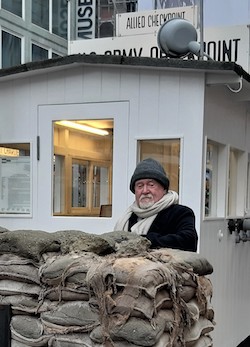
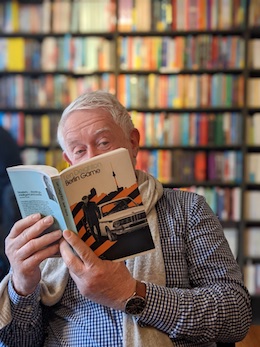
To accompany me on the trip, I took one of the few Hammond Innes novels I had never read, his 1951 thriller Air Bridge, which seemed an appropriate choice as it was set at the time of the Berlin Air Lift of 1948-49, or ‘Air Bridge’ as the Berliners called it.
The dramatic period when the ‘Little Bear’ (Berlin) when cut-off from the west by the ‘Big Bear’ (Stalin) has featured in numerous excellent thrillers - notable examples by John Lawton and David Brierley - but in Air Bridge it is really only a plot point to the story, which has the usual Innes’ Everyman hero struggling against the obstacles placed in his way, seemingly at every turn.

The central character Neil Fraser is actually far from heroic and on the run from the police at the book’s outset, an ex-RAF pilot who has done some dodgy peacetime flying jobs. He is taken in (literally) by another ex-RAF flyer who is building two new engines to a revolutionary design - a design he ‘acquired’ from a German engineer as part of the spoils of war. In return for sanctuary, Fraser is put to work, the object being to get the new engines installed into a freight plane and to join the Berlin air bridge to prove the engine’s design and make a fortune out of its commercial development. In the event, Fraser is forced to steal an aeroplane from the air lift and by that time, over the Russian sector of Germany, things go horribly wrong. As with most Hammond Innes’ books, the hero is put through the mill physically as well as emotionally but still manages to fly a plane while sleep-deprived and shot.
Whilst the action drags somewhat in places, the book is notable for having (for Hammond Innes and for 1951) a brace of female characters who are complex, in one case sexually predatory, and brilliantly nuanced. Although I learned nothing about Berlin or the air-lift, or indeed the workings of piston engines, I am glad I read Air Bridge but it comes a long way down my list of favourite Hammond Innes’ books. Many of my generation have said they have a favourite Innes, but I’ve never heard anyone rooting for this one.
2021 Report Card
Despite all the difficulties of 2021 coming hot on the heels of the disruptions of 2020, which have beset the publishing of crime fiction, Shots has, I feel, been doing its bit to keep its readers up to speed. In the year just ended, the army of Shots reviewers covered more than 100 new titles and carried 17 major features. Under the steady hand of Ayo Onatade, the Shotsmag Confidential blogspot hosted more than 340 separate posts and this august column alone mentioned in excess of 200 crime and thriller fiction authors and their books.
My increasingly erratic database - which does not claim to be exhaustive - suggests that there were 695 new crime novels published in the UK in 2021. (These were titles published for the first time, not re-issues, and the total does not include eBook only or self-published work.) Given that several publishers have me on their naughty steps, the figure of 695 titles - which is about one new book every 12½ hours - should be taken as a minimum.
Most interesting is the number of crime novels by women (at least 347), which makes females responsible for 49.9% of crime fiction, the highest percentage I have ever recorded. Until last year, and even in the so-called ‘Golden Age’ of detective fiction, women crime-writers were responsible for between 33-36% of titles - which is not, of course, the same as sales.
All Our Yesterdays
(Well, mine anyway)
1997 proved to be one of the most productive years for reviewers of crime fiction, or at least this one, not just in my regular Crime Guide column in the Daily Telegraph, but also in Publishing News and Books Magazine, after some bright spark had worked out that a new crime thriller was published in the UK at the (then) rather sedate pace of one every 28 hours.
The year began with a quartet of anthologies covering murder mysteries, hardboiled ‘pulp frictions,’ murders from ancient Greece and Rome (Anthony Price and Lindsey Davis being the leading lights) and ‘an anthology of assassins’ which failed to mention either a Jackal or a Rogue Male.
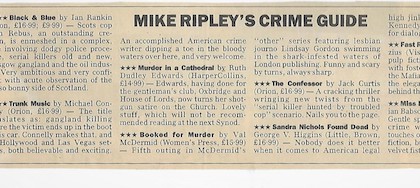
The first tranche of crime novels of the year though were of the highest quality, with strong stories from Michael Connelly, Ruth Dudley Edwards, Val McDermid, George V. Higgins and Mike Phillips, writing under the pen name Joe Canzius. My prime pick was Ian Rankin’s Black and Blue, which, I eventually named as my book of the year.
In her first column of 1997 in the Times Literary Supplement, my fellow reviewer the erudite Patricia Craig ruminated on the increasing appearance of cats as adjuncts to fictional detectives, citing Whitey in the Joe Sixsmith novels of Reginald Hill, ‘the bruiser’ Plutarch in the Baroness Troutbeck tales of Ruth Dudley Edwards and, generously, ‘Springsteen in the Angel novels of Mike Ripley’.
I Spy Famous Names
Two famous names in both spy fiction and spy fact feature in the publishing schedule for March this year: Dame Stella Rimington, the former Director-General of MI5, and Charlotte Philby, granddaughter of Kim, Britain’s most notorious (or successful?) traitor.
When I interviewed Dame Stella three years ago at the Slaughter In Southwold crime festival, she indicated that her latest novel, The Moscow Sleepers, could well be her last as she was thinking of retiring from spy fiction as well as spying.
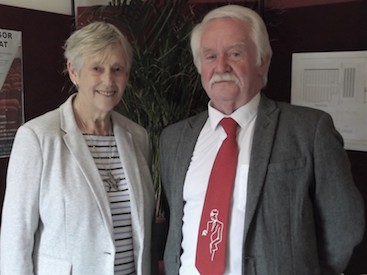
I am delighted to say she was feeding me a false legend as her new thriller, The Devil’s Bargain, will be published by Bloomsbury.
From The Borough Press, in the same month, comes Edith and Kim by Charlotte Philby, which tells the story of Edith Tudor-Hart, ‘the woman behind the Third Man,’ who introduced Kim Philby to his Soviet handler. I have had a sneak preview of Charlotte’s novel and I have a feeling it could be her strongest novel yet.
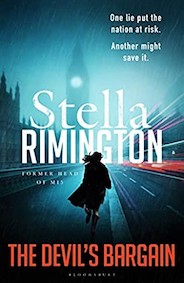 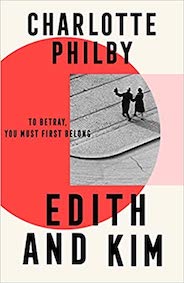
Bye, Bye - For Now
I hear that Ace Atkins, one of the continuation authors of the works of the late Robert B. Parker, has decided that Bye Bye Baby, to be published here by No Exit in August, will be his last novel to feature Spenser, Parker’s famed Boston private eye. It will be Atkins’ tenth Spenser novel and, amazingly, the 49th (or 59th as one source claims) Spenser adventure over all, but I doubt it will be long before the Parker estate appoints another author to continue this iconic series which began in 1973.
A Very Hard Act To Follow
I was saddened to hear, over the Christmas period, that cult American crime writer Andrew Vachss had died, aged 79.

A former social worker, federal investigator and attorney who only represented juvenile offenders or the victims of child abuse, as well as a volunteer aid worker in Biafra in 1969, Andrew turned to crime fiction in the late 1980s with a unique take on urban noir and a totally distinctive writing voice.
I cannot remember exactly how I first came into contact with Andy, but on the strength of being an instant fan of his early novels Flood, Strega and Blue Belle (all recommended to me - I mean sold - by Maxim Jakubowski at Murder One) I contacted him via his New York office. This was no mean feat as, the target of numerous death threats, Andrew took very strict security precautions. I must have asked him to pass something on to someone for me - I honestly cannot remember what - because in 1990 he sent me a copy of Blossom which he inscribed ‘from your faithful courier’.
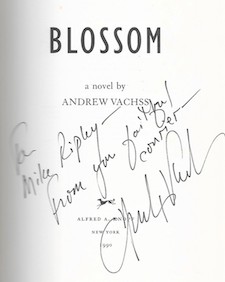
It was the start of an exchange of books and messages which went on for more than twenty years. Andrew even blurbed my first ‘Angel’ novel to be published in America - “What Ripley does to comedy is criminal, and what he does to crime fiction is hilarious. Like Kinky Friedman with a British accent.”
His initial series of novels featuring his urban vigilante Burke and his stand alone Shella still remain high-water marks in hard, violent, no-prisoners American noir which attracted a cult, and still loyal, following. Vachss’ urban settings were grim, almost post-apocalyptic, cruel and paranoid where only the dogs (usually pit-bulls or Dobermen and always big) could be relied upon. His righteous anger and distinct writing style won him prizes in Japan, Germany, France and Italy but he never abandoned his legal practice and his expertise in dealing with juvenile crime lead to legal text books and an input into US legal legislation.
Under Cover(s)
The name ‘Hank Janson’ was once, in certain circles, a byword for sleaze and definitely the books supposedly written by him (or starring him) were not the sort of literature you would want your servants to read. Today, six or seven decades after the last one was written - and goodness knows how long since one was read - ‘Hank Janson’ is a byword for British pulp fiction in its heyday, the late 1940s and early ’50s, but really the books are best remembered for their cover illustrations, which resulted in a famous obscenity trial.
I once interviewed a recognised authority on the Hank Janson oeuvre who, staring contemplatively into his pint (okay, we were in a pub) said: “If only the books had been better...”
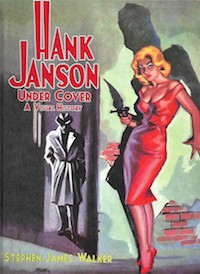 However, the covers, from the classic ones by Reginald Heade onwards, were memorable, if not exactly politically correct these days, and are, in a way, historic social documents. They are celebrated in all their glory in Hank Janson Under Cover - A Visual History by Stephen James Walker [Telos Books] which is a quite fantastic labour of love, but nonetheless a useful historic footnote in the story of British crime fiction. However, the covers, from the classic ones by Reginald Heade onwards, were memorable, if not exactly politically correct these days, and are, in a way, historic social documents. They are celebrated in all their glory in Hank Janson Under Cover - A Visual History by Stephen James Walker [Telos Books] which is a quite fantastic labour of love, but nonetheless a useful historic footnote in the story of British crime fiction.
This is a comprehensive over-view of the faux American gangster pulp craze which sold millions of cheap copies, though nobody seemed to get particularly rich in the process, where women were mostly referred to as ‘dames,’ ‘tramps’ or ‘frails.’ It was an era when you certainly could judge book by its cover and some of the titles could certainly have appealed to the easily-suggestible.
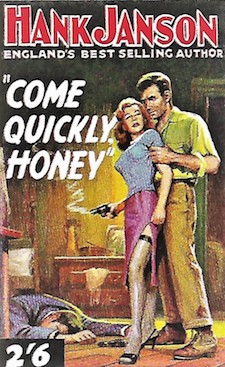 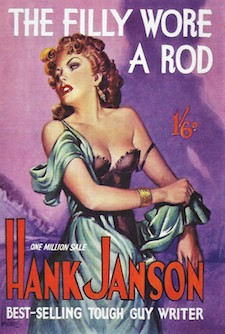
Hank Janson Under Cover, also explores the success of the Hank Janson franchise beyond Britain and I was genuinely surprised to discover how many foreign editions of the books there had been, in France, Spain, Holland, Denmark, Germany, Finland, Sweden and Norway.
One in particular caught my eye, the German edition of Hank (Janson) and the Gangster Gang because the cover bore a striking resemblance to that of my 1969 paperback edition of Len Deighton’s An Expensive Place To Die...
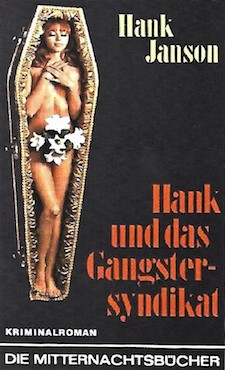 
Munich
For legal reasons, I never reviewed Robert Harris’ 2017 novel Munich when it came out and only got round to buying a copy last year, thoroughly enjoying it although I already knew (as with his Pompeii) how the story ended.
Now a Netflix film version appears this month, Munich: The Edge of War, with Jeremy Irons as an eerily convincing Neville Chamberlain.

The film also stars George Mackay (who was brilliant in both 1917 and the fantastic Sunshine on Leith) as Harris’ young diplomat hero and also that stalwart British character actor Nicholas Farrell, who seems never to have been out of work since Chariots of Fire.
Over the Christmas period, Nicholas Farrell began to appear on television and in the advertising supplements of the quality newspapers as the new ‘face’ of SAGA holidays and, quite honestly, I was appalled. He is younger than I am.
|
|
An Sgeulaiche
I was advised by a contact in the Spybrary network that I might be interested in a recent programme broadcast on the BBC’s Gaelic channel ALBA (who knew?) which featured possibly the most-famous Gaelic-speaking thriller writer of all time, Alistair MacLean.
Now my Gaelic is patchy to say the least (I have no talent for modern languages) but I believe the programme title, Alistair MacLean: An Sgeulaiche, translates loosely as ‘Alistair MacLean: Storyteller.’
At the height of his fame, an Alistair Maclean thriller was bought, somewhere in the world, every 18 seconds and 18 of his 28 novels were filmed, some of them very well, some not, providing him with an itinerant tax-avoiding life, homes in California, Yugoslavia and Switzerland, two failed marriages and a drink problem.
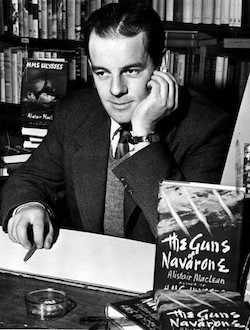
The Alba documentary does not shirk the fact that MacLean had problems which, according to one theory I heard years ago, were a result of Calvinist guilt at making so much money from an activity he did not seem to think too highly of. It also contains television interviews I had never seen before (though I was once treated to the unexpurgated story of an interview with the author by the late film critic Barry Norman), including with his publisher and long-time friend Ian Chapman, who persuaded the taciturn Glasgow schoolteacher to write HMS Ulysses which launched MacLean’s career in 1955.
Personally, I was delighted that the programme included contributions from Dawn Sinclair, the William Collins’ archivist in Glasgow, who has helped me in my research many times in the past, but whom I have never met.
Anyone who read The Guns of Navarone, Ice Station Zebra, Breakheart Pass or Where Eagles Dare (most people will have seen the movies), will enjoy the Alba documentary, which I am told is available on the BBC’s iPlayer service, though I cannot for the life of me remember what the Gaelic is for ‘iPlayer.’
Coming Up
With bated (or at least masked) breath and crossed fingers, I have perused the 2022 catalogues of various publishers to spot forthcoming titles which are likely to raise my spirits. I am delighted to say I found several new books to add to my WOF (Watch Out For) list, though my TRB (To Be Read) pile is already a Pisa-worthy tower of proofs of new titles, some not due to be published for six months or more.
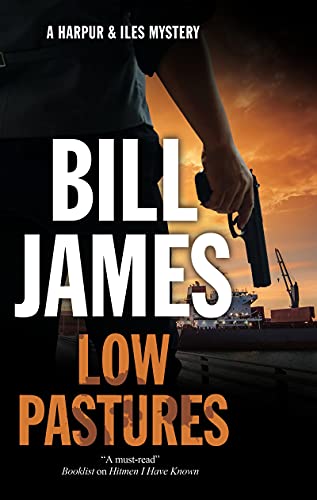 The first on my list, as it is published this month by Severn House, is Low Pastures, the 36th ‘Harpur and Iles’ policier from veteran crime writer Allan Tucker, writing as Bill James, the best known of his several pen-names. The first on my list, as it is published this month by Severn House, is Low Pastures, the 36th ‘Harpur and Iles’ policier from veteran crime writer Allan Tucker, writing as Bill James, the best known of his several pen-names.
Now 92, Welsh journalist ‘Bill James’ began writing fiction in 1968 and has published 69 novels and works of non-fiction. His crime writing is highly admired by such as Peter Guttridge and John Harvey, who know a thing or two.
In February Thomas Mogford, whose contemporary ‘Mediterranean’ thrillers I have much enjoyed in the past, takes a new name and a new tack with the historical adventure The Planthunter as by T.L. Mogford which is set in 1867 at the height of the Victorian obsession with discovering and collecting exotic flora.
As the Dowager Lady Ripster has to be strip-searched on her regular visits to the Chelsea Flower Show, I can confirm that the plant-hunting obsession is very real even now, not to mention dangerous.
April sees two authors who go, sight unseen, on to my TBR pile without passing ‘Go.’ Lindsey Davis, with Desperate Undertaking [Hodder] gives us another delightful tale featuring Flavia Alba, her Roman sleuthette and South African maestro Deon Meyer provides another case for his brilliant creation Benny Griessel in The Dark Flood [also from Hodder].
And in June, the Rev. Richard Coles - the coolest vicar on Radio 4 - marks his debut as a crime-writer with Murder Before Evensong published by Weidenfeld.
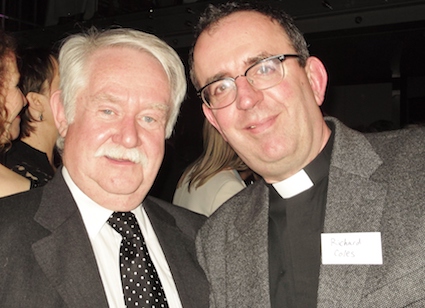
I met Richard some while ago, funnily enough at a publishing party (and that dates me!) where he was utterly charming and the last person in the room I would have thought would turn to a life of crime.
Books of the Month
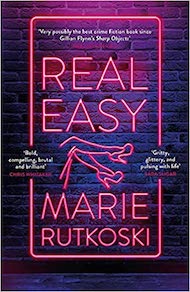
For some strange reason, when I first saw the cover of Real Easy by Marie Rutkoski [Tinder Press], I thought it would be a light-hearted piece of comic crime, possibly set in Florida. I could not have been more wrong.
This is a tough, uncompromising chiller set around an American mid-western lap-dancing club (an art form I have never appreciated) and the women who work there to titillate men and, very often, end up as their prey. Told from multiple points of view, mostly female - including that of an impressive female detective character - Real Easy is a gripping, serial-killer thriller with several eye-popping shock moments, but more thoughtfully, is an examination of the dangers facing women trying to escape messy private lives by working in a messy industry pleasing men, the cause of most of their problems in the first place.
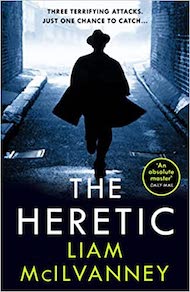
The gangland turf wars of Glasgow in the 1970s have been much covered in crime fiction recently, notably by Alan Parks in The April Dead and in The Dark Remains by William McIlvanney and Ian Rankin. Now Liam McIlvanney (son of William) weighs in with The Heretic [HarperCollins], a quite magisterial 500+ page saga.
The 1975 setting in all its grimness is very well realised and McIlvanney shows a wonderful use of language throughout. A woman “unsnibs the window”; a murder victim who “had been plunged in the stomach with a breadknife” by his wife while sat in his armchair watching Match of the Day, is “Puddled in blood. His lap sopping”; Glasgow is a “jumped up village” and “a cliff of black tenements”.
Terrific stuff.
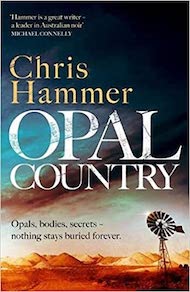
I wrote last year that I would like to see Australian Chris Hammer expand his work beyond his three (very successful) novels featuring journalist Martin Scarsden and although he cannot resist name-checking his long-suffering series hero, Hammer does just that by moving into Opal Country [Wildfire].
Once again, the journalistic eye which Scarsden shares with his creator Hammer is used forensically to described, in great detail, the outback town of Finnigan’s Gap, its inhabitants and its main industry, the mining of opals. Homicide detective Ivan Lucic is flown in to investigate the murder of a miner who has been found crucified in the shaft of his own opal mine. Lucic comes, of course. with baggage, being regarded as something of a whistle-blower against corruption by his fellow New South Wales police, but in the outback he is assisted by enthusiastic local rookie cop Narelle Buchanan - an excellent creation.
Opal Country is a long, slow-burner of a thriller, richly rewarding the reader with fine, evocative prose as Hammer is quite brilliant at describing the brutal oven of the Australian interior.
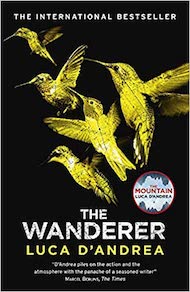
I am not sure that Luca D’Andrea is ‘Italy’s bestselling answer to Stephen King’ as his publicist maintains, but he can certainly project an element of spookiness into his writing.
The Wanderer [MacLehose Press] is set in the Alto Adige, the mountainous region of north Italy bordering Austria, where roadside food stalls sell bratwurst and any discerning Italian would turn their nose up at the idea of Schuttelbrot and speck for breakfast. Given the terrain, it’s hardly surprising that isolated villages such as Kreuzwirt harbour dark secrets and superstitions, especially when the place is dominated by the Perkmans, a family with more than one skeleton in its armoire.
Digging in to a past supposed suicide is the unlikely duo of the young, orphaned daughter of the suicide and Tony Carcano, a best-selling writer of romantic fiction known by his publicist as ‘Sophie Kinsella in lederhosen’ which is an image likely to stay with me. Carcano, or Luca D’Andrea, shows his modern credentials by citing the John Wick movies and his musical influences of Fiona Apple and Tyrolean country-and-western singer George McAnthony. (No, me neither.)
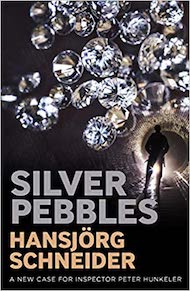
Hansjorg Schneider is perhaps an unfamiliar name to most British readers but in Europe, the Swiss journalist-turned-playwright-turned-crime-writer, now aged 82, is a well-respected figure, not the least for his creation of his detective hero Inspector Peter Hunkeler of the Basel police.
Silver Pebbles [Bitter Lemon] is the second Hunkeler book to be translated, although it was first published in German back in 1993, and concerns a streetwise Lebanese ‘drug mule’ who is almost caught with a consignment of diamonds at Basel train station. Thinking quickly, he flushes the diamonds down a public toilet only for them to be found by a Turkish immigrant working for the city’s sanitation department, somewhat to the dismay of his unofficial Swiss wife. Inspector Hunkeler follows this rather soggy trail to find the drug dealers who want their diamonds back although at times with the cynicism of a man who ‘had been in the police too long to worry about personal failure’.
Hunkeler has been compared to Simeon’s Inspector Maigret, though there are no wreaths of pipe smoke or constant breaks for a quick digestif. After all, Basel is not Paris, it is cleaner, greyer and harder. Perhaps that’s the point.
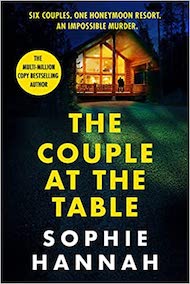
There is a definite trend at the moment for crime novels set in closed-circuit environments if not actually ‘locked rooms’: luxury resorts, rural retreats, islands, college reunions, company team-building exercises, holiday cabins in the woods, that sort of thing. In Sophie Hannah’s The Couple At The Table [Hodder] it’s an upmarket, couples-only honeymoon retreat, where sitting down to dinner turns out to be the most dangerous activity on the agenda and where a murder which seems impossible to commit is, of course, committed.
As only to be expected from Sophie Hannah, plot threads from both past and present are deftly woven together, though the actual act of homicide requires a hefty suspension of disbelief. I was reminded of Raymond Chandler’s observation (I paraphrase) that if a murderer has to rely on such a set of circumstances, they are probably in the wrong business.
The detective works everything out by gut feeling (and little grey cells?) and by spotting slips of the tongue rather than physical evidence and all the suspects are gathered together in classic style for the final reveal. Sound familiar?
Unsettling Trend
One rather unsettling trend in forthcoming crime fiction, is that in two new crime novels - and it’s still only January - a significant plot point is the death of a child who has been left unattended in a parked car. I really hope this is a coincidence and I will not have to mention it again in 2022.
Get jabbed, especially if
going to Australia.
The Ripster.
|